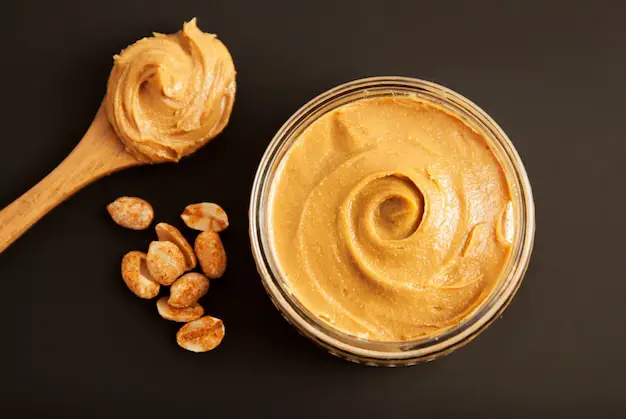Peanut butter, a heart-healthy food, is a go-to snack for many people. It is high in unsaturated fats, also called ‘healthy’ fats. They are called healthy fats as they protect your cardiovascular system by lowering your ‘bad’ LDL cholesterol levels. Peanut butter is also rich in certain vitamins and minerals that help remove toxins from your body and help in tissue growth. Many gym-goers like to have peanut butter because of its high protein and fat content.
Protein helps repair muscle fibers, whereas fat, as mentioned earlier, help maintain good heart health.
Nutritional Value of Peanut Butter
A 100gm portion of peanut butter has the following important macronutrients:
- Carbohydrates: 17gm
- Protein: 22.5gm
- Fat: 51gm
- Fiber: 5gm
It consists of many important micronutrients as well, such as:
- Vitamin E
- Vitamin B3
- Vitamin B6
- Folate
- Manganese
- Magnesium
- Copper
The total calories in a 100gm serving of peanut butter are 597 calories.
What is the pH of Peanut Butter?
Peanut butter has a pH of 6.3, which is slightly acidic. Therefore, consuming too much peanut butter may disrupt the acid balance in your body. However, there are not enough studies done backing this correlation; hence consuming peanut butter is not deemed to cause acidity.
Does Consuming Peanut Butter Cause GERD Acid Reflux?
Gastroesophageal Reflux Disease is a condition in which the acid flows back from the stomach to the esophagus causing acid reflux or heartburn. Acid reflux is a burning sensation in your chest that occurs due to the reflux of acid from the stomach into your esophagus (food pipe). It also gives a sour taste in the back of the mouth.
Peanut butter essentially constitutes roasted peanuts made into a thin paste. The high concentration of protein and fat in peanut butter can sometimes lead to acid reflux. It can be explained by the fact that food items like meat, cheese, and eggs, which are rich sources of fat and protein, relax the lower esophageal sphincter (LES), resulting in the backflow of the acid from the stomach into the esophagus, causing acidity in some people.
There’s no concrete scientific evidence to support the association between peanut butter and acidity, as not everyone consuming peanut butter experiences acidity. Trigger levels for acidity are different for different people. That may be why peanut butter can cause acidity in some people.
Can People with IBS have Peanut butter?
Peanut butter is generally considered a low FODMAP food and can be included in the diet of patients with Irritable Bowel Syndrome (IBS). FODMAP stands for Fermentable Oligosaccharides, Disaccharides, Monosaccharides, and Polyols. These are a group of short-chain carbohydrates and sugar alcohols that are poorly absorbed by the body, thus causing bloating and gastrointestinal pain.
According to a study titled “Dietary Fructose Intolerance, Fructan Intolerance and FODMAPs,” published in Current Gastroenterology Reports, FODMAP foods are carbohydrate-rich foods with specific sugars in them that can induce discomfort in those with sensitive digestive systems. As per a study named “Low-FODMAP Diet Improves Irritable Bowel Syndrome Symptoms: A Meta-Analysis”, published in Nutrients, adopting a low-FODMAP diet can help with irritable bowel syndrome and other gastrointestinal issues.
According to another study titled “Treatment of irritable bowel syndrome in outpatients with inflammatory bowel disease using a food and beverage intolerance, food and beverage avoidance diet,” published in Inflammatory Bowel Diseases, Volume 13, Issue 1, patients with IBS can incorporate peanut butter in their diet. But, one needs to look out for the fructose content in peanut butter since many patients having IBS have fructose malabsorption which can lead to digestive issues.
Because of its high-fat content, peanut butter has several health benefits, but that same fat also has the potential to trigger acid reflux symptoms. So it is best to avoid consuming peanut butter if you get severe acid reflux after consumption. If you are not sure whether peanut butter is the reason behind your acid reflux, you should see a doctor or a nutritionist.
Benefits of Having Peanut Butter
- Contains healthy fats which help lower blood cholesterol levels.
- A good protein source that helps build muscles.
- Rich in vitamins and minerals, thus ensuring a good supply of essential nutrients to the body.
- Promotes good digestion due to its high fiber content.
Who Should Not Have Peanut butter?
It is best for people having GERD and IBS to avoid having peanut butter if they have an intolerance towards it. One can also reach out to a healthcare professional who can help determine the exact cause of acidity.
Takeaway
As long as you have peanut butter in moderation and an overall balanced diet, you should be fine.
References
Arya, S. S., Salve, A. R., & Chauhan, S. (2016). Peanuts as functional food: a review. Journal of Food Science and Technology, 53(1), 31–41. https://doi.org/10.1007/s13197-015-2007-9
MacDermott, R. P. (2007). Treatment of irritable bowel syndrome in outpatients with inflammatory bowel disease using a food and beverage intolerance, food and beverage avoidance diet. Inflammatory Bowel Diseases, 13(1), 91–96. https://doi.org/10.1002/ibd.20048
Fedewa, A., & Rao, S. S. C. (2014). Dietary fructose intolerance, fructan intolerance, and FODMAPs. Current Gastroenterology Reports, 16(1), 370. https://doi.org/10.1007/s11894-013-0370-0
Altobelli, E., Del Negro, V., Angeletti, P., & Latella, G. (2017). Low-FODMAP diet improves irritable bowel syndrome symptoms: A meta-analysis. Nutrients, 9(9), 940. https://doi.org/10.3390/nu9090940


